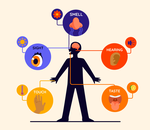Strategies to Help You Improve Your Mental Health
Feb 12, 2024 by Vreny Blanco · 5 min read · Mental Health

This article explores effective strategies for maintaining mental health, drawing on insights from our interview with psychologist and performance coach Kate Otte. These insights aim to deepen our understanding of mental well-being and provide practical advice for everyday life.
Understanding Mental Health
Mental health refers to our emotional, psychological, and social well-being. It influences how we think, feel, and act, and plays a critical role in how we cope with stress, interact with others, and make decisions. Raising awareness of the importance of mental health is the first step toward a more fulfilling and balanced life.
Factors That Influence Mental Health
Adverse childhood experiences can have long-term consequences by shaping personal development. They also serve as risk factors for mental illness in adulthood.
Risk factors that may contribute to the development of mental disorders in childhood and adolescence include: persistent family conflicts, certain parenting styles (e.g. abusive parenting), poverty, migration background, separation/divorce, bullying, chronic over- or under-stimulation, and parental mental health problems.1 The risk of developing a mental illness increases especially when multiple risk factors come together.
Protective factors that develop throughout life and strengthen our resilience include: family support2, a good social network, a healthy lifestyle, physical health and fitness, positive self-image, social, emotional, and cognitive skills2, positive social interactions2, education2, financial security, a fulfilling job2, a safe neighborhood or environment2, and effective coping strategies.
🌈 Strategies for Sustaining Mental Health
Now, I will present you with a series of practical strategies designed to help you navigate the complexities of mental health and cultivate a greater sense of balance and well-being in your everyday life.
Cultivate Self-Understanding
- Understanding yourself lays the foundation for personal growth.
- Recognize your thoughts and emotions and consider their impact on your behavior.
- Ongoing self-reflection can help you identify strengths and areas for improvement, deepening your connection with yourself.
Set Clear, Meaningful Goals
- Goals offer direction and purpose.
- Define clear objectives and make personal development an ongoing commitment.
- Clear, attainable goals allow you to focus your efforts, measure progress, and experience a sense of accomplishment that builds self-esteem and ignites motivation for continual growth.
Foster a Supportive Social Circle
- Invest in building a reliable support network that provides stability and reassurance.
- Surround yourself with positive influences who inspire and empower you.
Practice Positive Self-Talk
- The way you speak to yourself can shape your well-being.
- Practice positive self-talk and affirmations to counter self-doubt and cultivate a compassionate internal dialogue.
- Celebrate your achievements, regardless of size.
- Learn to tune in to your body and meet challenges with a constructive attitude.
Manage Stress Effectively
- Identify sources of stress and adopt healthy coping strategies.
- Mindfulness practices, meditation, and regular physical activity can greatly alleviate stress.
- Manage your time efficiently.
- Address tasks one step at a time, and set realistic expectations to prevent overwhelm.
Prioritize a Healthy Lifestyle
- Mental and physical health are inextricably linked.
- Consistent exercise, balanced nutrition, and adequate sleep form the pillars of well-being.
- Treat your body with care and respect—it’s essential to your overall health.
Embrace Digital Detox
- In a tech-saturated world, establishing boundaries is vital.
- Excessive screen time may lead to information overload, social withdrawal, and addictive behaviors.
- Dedicate time to unplug and engage in activities that restore joy and relaxation.
- Use an app and website blocker like 1Focus to eliminate digital distractions. Block distracting websites and block distracting apps, including social media, YouTube, Netflix, messaging, email, games, and more.
Find Work-Life Balance
- Set priorities and boundaries between work and personal life to prevent burnout.
- Develop the confidence to say no, delegate tasks, and schedule regular breaks.
- Achieving work-life balance is crucial for mental well-being and overall satisfaction.
Overcome Fear and Self-Doubt
Doubts and fears, while common, need not define your path. Consider the following approaches:
- Clarify your ambivalence: List pros and cons to organize your thoughts.
- Emphasize importance and urgency: Remind yourself why addressing your fears matters now.
- Strengthen your belief in yourself: Recall previous successes in similar circumstances—you can do this.
- Reality-testing: Imagine the worst-case scenario; often, it is less daunting than anticipated.
- Embrace exposure: Sometimes, taking the plunge—just doing it—is the quickest way forward.
Seek Professional Support When Needed
- If self-help strategies fall short, do not hesitate to seek professional guidance. You are the most essential person in your life, so prioritize your mental well-being.
As soon as you take responsibility for your life, you have the ability to shape it.
Conclusion
Mental health is a continuous journey, not a final destination. By integrating these strategies into your daily routine, you can nurture resilience, heighten self-awareness, and enhance your overall quality of life. Remember: taking that first step toward improved mental health is an act of strength. Embrace these approaches as you move toward a brighter, healthier future.
Further Reading
Don’t miss our interview with Kate Otte for additional tips and advice: Expert Advice: Strategies to Improve Your Mental Health.



